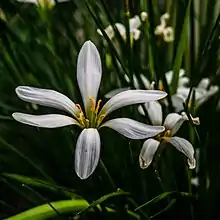Cooperia (plant)
Cooperia was a genus of tender herbaceous perennials native to South America and the southern reaches of North America. They were closely related to Zephyranthes and Habranthus, all of which are members of the amaryllis family, Amaryllidaceae. All three genera were commonly known as rain lilies because of their propensity for blooming after rains. Cooperia blooms in summer and fall.
Although Cooperia was considered distinguishable from the better known rain lily genus, Zephyranthes, by its fragrance similar to primroses, its white or yellow pollen, its tolerance for drout and desert conditions (Howard 2001:54) and tendency to be night-blooming (Ogden 1994:11), it is now considered to be part of Zephyranthes and the genus name Cooperia is no longer accepted.[1][2]

Cultivation
Cross-generic hybrids have been successfully created with both Zephyranthes (× Cooperanthes) and Habranthus (× Cooperanthus) (Ogden 1994:11, Howard 2001:54).
See also
Bibliography
- Fellers, John D. "A Passion for Rainlilies: Cooperia, Habranthus, and Zephyranthes." Herbertia v51, 1996, pp 78–112.
- Howard, Thad M. Bulbs for Warm Climates. Austin, TX: University of Texas Press, 2001, pp 53; 54-56.
- Ogden, Scott. Garden Bulbs for the South. Dallas, TX: Taylor Publishing Co., 1994, pp 5–27.
- WCSP (2016). "World Checklist of Selected Plant Families: Cooperia". The Board of Trustees of the Royal Botanic Gardens, Kew. Retrieved 15 February 2016.CS1 maint: ref=harv (link)
- GRIN (2016). "GRIN Taxonomy for Plants". Germplasm Resources Information Network. Retrieved 15 February 2016.CS1 maint: ref=harv (link)
External links
- Ladybird Johnson Wildflower Center Native Plant Information Network entry
- USDA PLANTS entry
- Texas A&M Research and Extension Center profile
| Wikimedia Commons has media related to Cooperia (plant). |